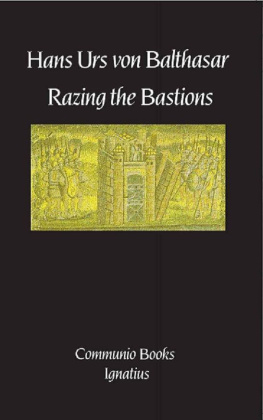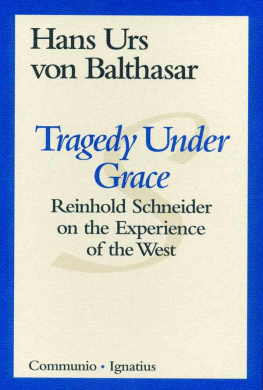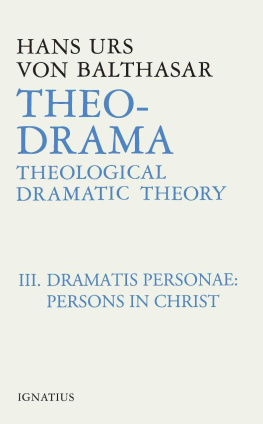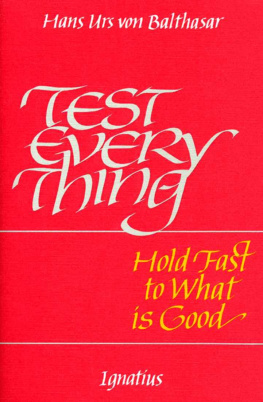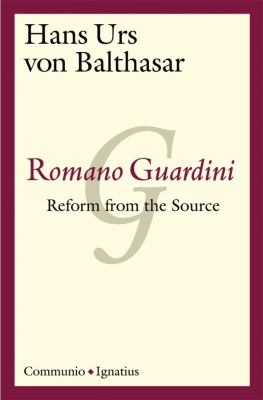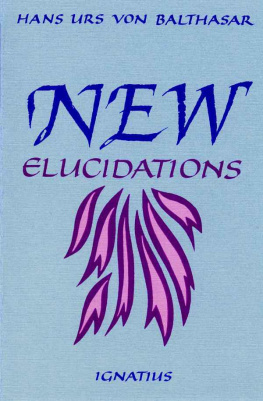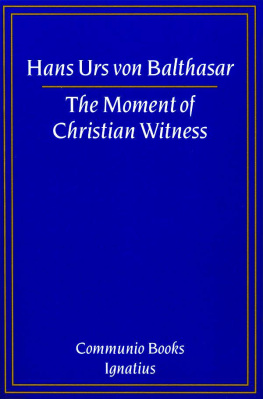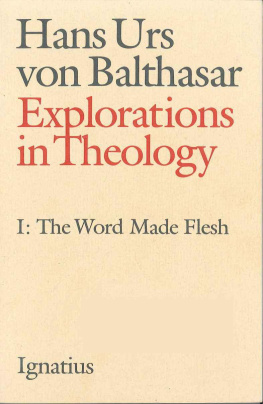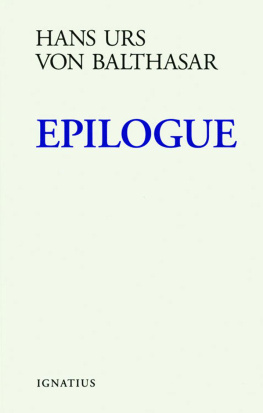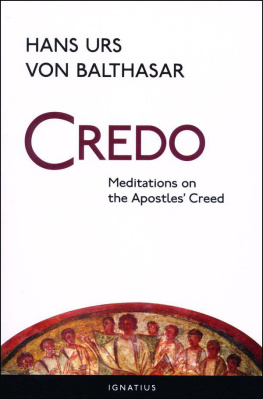Preface
In The Glory of the Lord, Hans Urs von Balthasar speaks of the need to find an index of interpretation when we come to the task of attempting to understand Gods self-manifestation in the world. The inadequacy of any worldly form to be this index of interpretation should be clear from a proper understanding of the nature of God, and yet in many ways it is the argument of the first volume to make this inadequacy clear. Gods appearance is not the necessary appearing of creaturely being; it is entirely at Gods own discretion and therefore the result of sovereign freedom. This makes it lordly and transcendent of any worldly measure. The only adequate measure would be one that is of the same provenance that is itself delivered in the moment of the appearing.
In like fashion, as I began the process of writing a dissertation, it was my goal, in the face of such a large corpus and so much confusion about where to begin with von Balthasar, to provide an index of interpretation. In the interest of respecting his right to speak for himself, I sought this index not outside of his writings but within them. This search led me to the belief that his doctrine of analogy is the key concept that unlocks the rest of his system. For even though Christ is at the center, one may still go on to ask what type of Christ von Balthasar has. And it quickly becomes apparent that Christology turns upon the doctrine of analogy.
In pursuit of this index of interpretation and the project of explicating it, I discovered that many passages were illuminated and a thoroughly rich read of von Balthasar was enabled. The outlines for a thorough study of the central moments of his theology began to emerge. However, the more I tried to bring these discussions to the center of the study, the more I realized that we were ill-prepared to talk about them. Too many terms and concepts have such specific meaning within the Balthasarian horizon for us to dare to leave them unexamined; we invariably would be translating von Balthasar into a foreign language without even realizing it and losing much of what is both distinctive and decisive, to borrow some of his favorite words. A study of his theology that would be sufficiently subtle seemed to me to first require an equally subtle study of his metaphysics.
It quickly became apparent that this was a type of task that has not really been done, and I was encouraged by the opportunity to contribute to the ongoing project of critical reflection on this great theologian by being the first to try my hand at so daunting a task. I did not, however, fully realize even at the time that I completed the dissertation the extent to which this study is meant to enable the later study. Only subsequent reflection has shown how much that is true and has allowed me to more properly cordon off issues that do not properly belong to this study.
This volume obviously revises the material found in that dissertation. But the greater difference between this study and that one is in the reorganization of the material, and the addition of much deeper discussion of the major themes. About forty thousand words have been added over the initial project, with an aim to strengthen the usefulness of this volume as a guide to von Balthasars metaphysical intuitions and commitments. The result is an argument that is the same as the original, but is drastically different in form, presentation, and depth.
Many people have encouraged me along the path to the completion of this task. First I need to thank my Doktorvater, Miroslav Volf, who kindly and insistently sent me back to the drawing board again and again until I was face to face with the fundamental choices that lead to this project existing at all. I am also indebted to my student Aaron Butler for his close reading of and careful commenting on the final draft of this book, and for a very enjoyable lunch during which, in painstaking detail, we combed through his thoughts and reactions. I am indebted to the University of the Free State in Bloemfontein, South Africawhere I am have been a Research Associate during the writing of this bookfor their continued support, as well as to the community of scholars at the Rivendell Institute at Yale, whose belief and sharp minds have greatly benefitted this project. The debt I owe to Yale University, which nurtured my doctoral studies, and the Yale Divinity School, where I have been fortunate to teach among the best imaginable colleagues and students, is not able to be repaid. I am grateful to have had the chance to teach twice on von Balthasar in that remarkable community of scholars, a place that has come to me more than any other to feel like home. Last and above all I would like to thank my wife, without whom I proved incapable of finishing the dissertation, and with whom I have found the ability to continually deepen and sharpen my engagement with von Balthasar.


